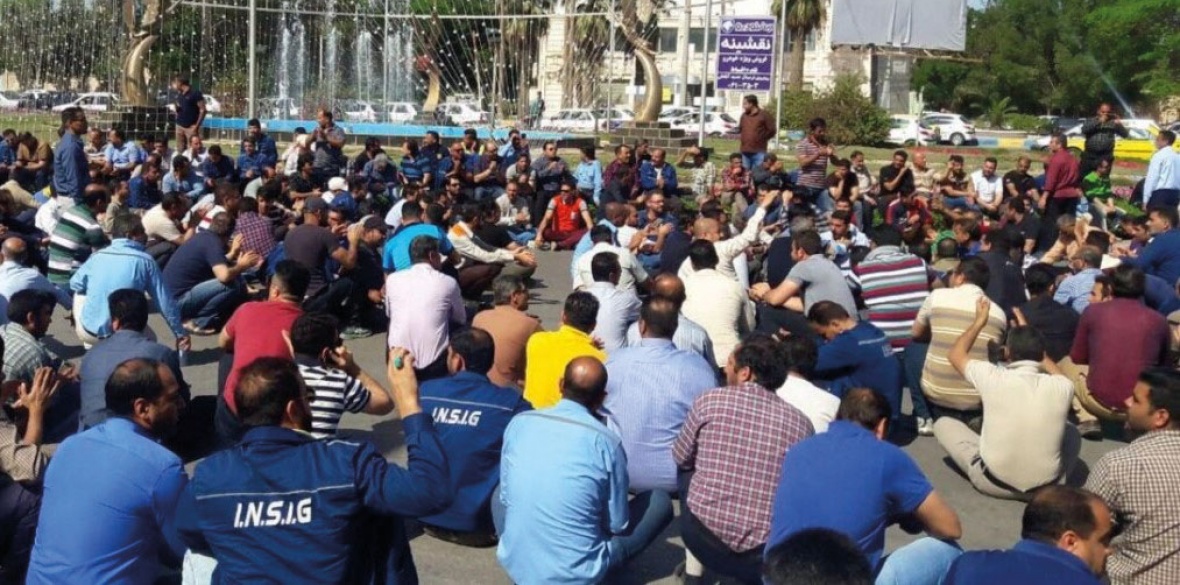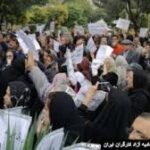
Amid plunging living standards, government corruption and state oppression, strike waves are spreading across Iran, reports STEVE BISHOP
THE Committee for the Defence of the Iranian People’s Rights (Codir) has called for the international trade union movement to back the calls of Iranian workers in their struggles for improved recognition, pay and labour rights.
The strike wave and industrial action which has been a feature of life in Iran for the past two years continues to escalate into 2024. At the end of December, after eight days of strike action, the workers of the Iran National Steel Industrial Group (Insig) in Ahvaz, in the south of Iran, decided to go back to work after they were promised that the employer will implement the Job Classification Act (JCA) at their workplace.
Without job classifications, workers can work full-time for years and be held in precarious temporary positions while being paid at varied rates, even while doing the same work. In particular, workers at the Insig work in an environment where the employer can at any moment deprive them of the right to make a living by simply disabling their entry cards. Workers live with the constant stress of becoming unemployed.
That the majority of wage earners in Iran are not covered by the JCA, and that their jobs remain unclassified, has become the status quo in Iran. In the past three decades, there have been thousands of spontaneous protests, strikes, sit-ins and work stoppages in various economic sectors, from education, healthcare and transport to agriculture, automotive, energy and steel industries, aimed at forcing the government to meet its obligations under the JCA.
Commenting on the Ahvaz steelworkers’ strike, Maziyar Gilaninejad, spokesperson of the Union of Metalworkers and Mechanics of Iran (UMMI) stated: “In my opinion, the most important aspect of this strike has been the total solidarity of all workers involved. The UMMI has supported the steelworkers’ action from the very beginning. It is also important to note the declaration of solidarity made by the country’s popular and influential pensioners’ movement in Tehran on Sunday December 24, as well as that of their counterparts in Kermanshah a week later.”
The recent strike at Insig-Ahvaz is the result of several years of struggle for which the workers have paid a heavy price. Workers have sustained their fight in the face of intimidation and ongoing government propaganda.
The right to demand job classification is the key to future struggles of Iranian workers. Workers know that without job classification their job security will continue to deteriorate. They continue to demand that they should be placed in their real job positions according to experience and qualification, because they have invested time, effort and finance to acquire specialist skills.
Codir general secretary Gawain Little expressed outrage that workers in Iran are not even able to access these most basic rights.
“February this year will see the 50th anniversary of the passage of the JCA through the Iranian parliament,” said Little, “yet the Act has not yet been fully implemented in Iran as the regime see maintaining economic uncertainty amongst the workforce as a higher priority than achieving fair pay and improved working conditions.”
The level of discontent in Iran can be measured in part by the wide range of strike action which is affecting all parts of the economy. Protests and strikes directed against the government by steelworkers, nurses and retirees are continuing across Iran, citing plunging living standards, government corruption and state oppression as the main areas of concern.
In December, telecommunication retirees in 15 provinces protested outside the state-run Telecommunication Company’s offices. Other retirees, including former oil workers, teachers and other former public-sector workers, also protested in many towns and cities. Goldsmiths in Tehran and Hamadan have been on strike to protest an increase in taxes, joining other goldsmiths across Iran.
Action has also been taken in key strategic areas likely to have a significant impact on the struggling Iranian economy. For example, explaining the significance of the industrial action undertaken by the workers and official employees of the Iranian National Oil Company, in protest at the current working conditions in the oilfields in southern Iran, UMMI representative, Gilaninejad, commented: “The official oil workers’ protest, in what is an industry of huge strategic economic importance, represents an existential threat to the government.
“It is especially significant that these protests have taken shape in the oilfields and terminals of Sirri, Lavan, Khark, and Bahregansar, the principal locations from which Iranian oil is exported.”
In pledging the support of Codir for the struggles of Iranian workers, Little emphasised the scale of the present strike wave.
“Such open opposition to the regime in Iran, as expressed through the present strike movement, is unprecedented in the 40 years of the Islamic Republic,” he said. “Workers in the industrial, public and private sectors are combining to demand better terms and conditions but also express their dissatisfaction with the regime itself, adding a whole new dimension to the protests.”
The position for Iranian workers is further exacerbated by the current state of the economy. According to the government-run website, IRNA, inflation has risen to 250 per cent in the past two years, massively impoverishing workers. Iran’s economic problems have been made worse by the ongoing sanctions imposed by the United States.
In addition, Iran is increasingly in danger of being drawn into wider regional conflicts, not least the continuing Israeli genocide in Gaza.
Codir has called for all forces supporting the struggle for trade union, human and democratic rights in Iran to support the demands of Iranian workers through issuing statements of solidarity.
Codir requests that trade union affiliates write to the embassy of the Islamic Republic of Iran (please see below for the address) to make clear their opposition to the lack of implementation of the Job Classification Act and demand that the Iranian government takes steps to translate the articles of the Act into action.
Mr Seyed Mahdi Hosseini Matin, Ambassador
Embassy of the Islamic Republic of Iran
16 Princes Gate
LONDON
SW7 1PT
Email: iranemb.lon@mfa.gov.ir
Codir is also asking for individuals to write to their local MP, drawing their attention to the worsening situation inside Iran and requesting that they write to the embassy of the Islamic Republic of Iran on similar grounds, as well as using their platform in Parliament, to draw attention to the plight of the people of Iran.
Steve Bishop is a senior executive member of the Committee for Defence of Iranian People’s Rights (codir.net) and a regular contributor to the Liberation journal.












 Posted in
Posted in 











